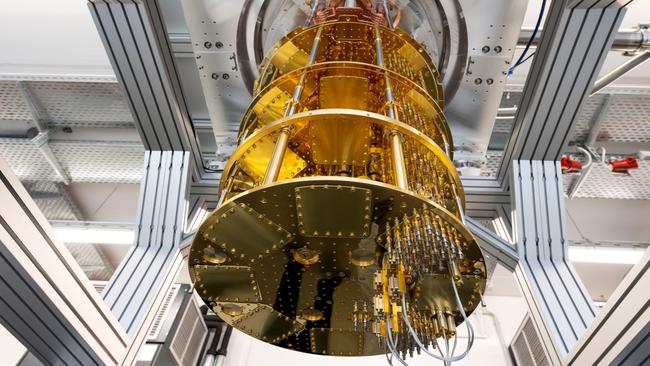‘Just like the atom bomb race’: tech boss praises Australia’s $1bn quantum investment
DigiCert boss Amit Sinha believes the benefits from quantum computing – which remains a promising but elusive technology – outweighs the risks. But he says governments and companies need to be prepared for the fallout.

Global security company DigiCert has backed a $1bn taxpayer-funded investment to build Australia’s first quantum computer, likening the scramble to develop the tech to the race to detonate the atom bomb in the 1940s.
Amit Sinha – chief executive of DigiCert, which is on track to hit $US1bn ($1.51bn) a year in revenue – says the leap into quantum computing risks an “extinction level event for current cryptographic standards” and says governments and companies must start preparing themselves.

Mr Sinha said quantum computing gives malicious actors the opportunity to break encryption algorithms and exploit the inherent trust that users place on legitimate applications and websites, and only post-quantum cryptography can defeat the threat and preserve the sanctity of digital communications.
“From a trust perspective, I’d say the biggest challenge of our time is what’s real, and what’s fake? Half the world is going through an election cycle. How do you know that a piece of content that you’re consuming has not been tampered with, edited, changed?” he said.
“It’s not like the solution doesn’t exist. It just requires urgency and action. Just like there was Y2K you had to update things, and you would go into a new millennium. Here, you have outdated cryptography and outdated digital trust scanners. New standards are coming. You just need to prepare for it.”
Anthony Albanese and Queensland Premier Steven Miles each announced about $470m in equity and loans in April to help US outfit PsiQuantum, headquartered in Palo Alto, build a yet to be developed fault-tolerant, quantum computer in Brisbane.
Industry Minister Ed Husic acknowledged PsiQuantum would own the computer once it was successfully built, but that Australia would get access to its computing power “for what we need or what industry needs”.
While the move attracted praise from the tech industry, it also sparked criticism after it was revealed earlier this month that PsiQuantum was the only quantum computing company the federal and Queensland governments put through a formal due-diligence process.
PsiQuantum co-founders Jeremy O’Brien and Mark Thompson were also listed as contributors on multiple research papers by Chinese quantum experts and academics from universities and institutes deemed high-risk by security analysts and sanctioned by the US government.

Mr Sinha declined to weigh into the politics of the federal and Queensland’s government investment in PsiQuantum but said: “you’re either embracing the technology and growing or you’re becoming irrelevant”.
“I think it’s great that Australia is investing (in a quantum computer). What are the three tectonic shifts that are going on these days? You hear about generative AI, there’s quantum computing and there IoT (internet of things) device proliferation.
“You can always argue that $1bn could be used for other welfare programs. But at the end of the day, It’s like space exploration, right? It’s like going to the moon or building something that advances humanity.
“And it’s great that Australia is taking an interest in that, as opposed to saying, ‘look, you know, let the US innovate, let Europe regulate and let China imitate, and we’ll see what goes on’.”
It’s also hard to ignore the global race to develop the technology, with countries like China making new strides as it seeks to join the US as a leader in quantum computing.
“I was pretty happy to see Australia take a bold step like that. Usually, mostly these types of investments come out of the US. But it just signifies that there’s a push globally to get to these beautiful machines that promise, kind of the next quantum jump.
“That physicist and the quantum mechanics community and the quantum computing community is rather small. So I think regardless of nationality, these experts kind of know each other, whether they’re in China or PsiQuantum or Australia. And I think nation states, it’s like ‘we’ll build the first atomic bomb’. Everyone wants to be first.”
But Mr Sinha believes the benefits from quantum computing – which remains a promising but elusive technology – outweighs its risk. Particularly in how it could speed up drug development and climate modelling.
“Who doesn’t want better medicines and the ability to predict what’s going to happen with the long term climate. There are so many benefits that we can get out of this, we just need to be prepared for the fallout.”
He said companies including Apple and Meta have already switched over to post quantum cryptography in their respective iMessage and WhatsApp platforms.
“They were worried about ‘harvest now and decrypt later’ attacks. Think of it as double locks in a way, right, like there’s a pre quantum lock and a post quantum lock. And so now you have two locks on the door. Even if you open one, you can’t open the other.
“That’s what progressive companies are doing. Just like Y2K, you have to plan, what servers, what databases, what fields you need to get an inventory, and then you start acting on it. Then build in workflows and automation, at least make sure that your crown jewels are identified, and you know that you have an upgrade path for them.”






To join the conversation, please log in. Don't have an account? Register
Join the conversation, you are commenting as Logout